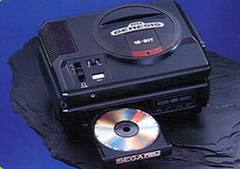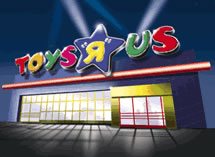Had I known then what I know now, I would have undoubtedly skipped purchasing the Sega CD. While the unit has its share of good software, no title provided the salve to take the sting out of paying such a high price for the so-called next level of video games. I’m embarrassed to say I was suckered into buying the Sega CD — the very same unit — twice. Initially I was thrilled by the prospect of playing all of these great PC titles on my Genesis as I could not afford a PC. After a couple of years of disillusionment, I pawned it off on a friend of a friend, only to buy it back yet again with the launch of the 32X, with press noting how games utilizing it and the Sega CD would bring 32-bit gaming home at a fraction of the price. I swear, I love you, Sega, but my naive 15-year-old anus could only take so much.
 Still, I bought into Sega hook, line, and sinker. I was so enthralled with the Genesis and Sega’s innovative output that I just had to get the Sega CD. It absolutely had to be mine. Yet, the $300 price tag posed a problem. I was poor. A lack of transportation made working difficult. The only money I had was what I received for Christmas and my birthday. I would have to hope that relatives would lavish $300 upon me over these two days. If this story were a film, this would be a montage of me just going through my daily routine, boring the audience to death unless the music was really good — good enough to overcome the notion that so much time is being wasted devoted to witnessing someone else’s passage of time, though it adds nothing to the story.
Still, I bought into Sega hook, line, and sinker. I was so enthralled with the Genesis and Sega’s innovative output that I just had to get the Sega CD. It absolutely had to be mine. Yet, the $300 price tag posed a problem. I was poor. A lack of transportation made working difficult. The only money I had was what I received for Christmas and my birthday. I would have to hope that relatives would lavish $300 upon me over these two days. If this story were a film, this would be a montage of me just going through my daily routine, boring the audience to death unless the music was really good — good enough to overcome the notion that so much time is being wasted devoted to witnessing someone else’s passage of time, though it adds nothing to the story.
Two weeks after Christmas my birthday arrived, and I found myself $200 richer. Stating the obvious, this was not enough to purchase the Sega CD. If I were a dumb kid, then perhaps my Sega CD mistakes could have be averted as I would accept that I simply could not afford it and find a cheaper substitute. This would not be the case, however, as I sought a way to somehow turn my $200 into Sega CD money. I would become an entrepreneur.
I had learned that it pays to notice the price discrepancy of items among various stores. When money is tight -“tight” being slang for “having little because you’re poor” for those reading from the country club – you have to shop around to get the best value for your dollar – “dollar” being a single unit of U.S. currency for those still reading from the country club. In fact, such comparison shopping is what led me to buy my first mail order purchase. I bought Strider from Chips & Bits after seeing the company’s advertisement in Video Games & Computer Entertainment through the mail, the Internet of its day. It wasn’t much of a savings over the local stores — I believe $8 or so — but that was more than enough for me to put up with the couple of weeks’ delay.
So, when on a visit to Toys R Us I noticed it was selling Star Control for $79,99, a figurative light bulb popped over my head. I knew I saw it cheaper in a magazine, and sure enough Chips & Bits had Star Control for under $50. It didn’t take long for me to send my $200 through the mail and watch it magically turn into four brand new copies of Star Control. Over the next few months I would bring a copy of Star Control over to Toys R Us and exchange it for Geoffrey money,. I went to each of the three Toys R Us stores in the area collecting Geoffrey money until finally that magical day came.
That October I found myself in Toys R Us with my last copy of Star Control. With a fistful of giraffe-stamped bills, I walked over to the video game isle, pulled the ticket for the Sega CD, and made it over to the counter to pay for it. Then I got home with my new toy and really paid for it. I paid for it having to listen to Fleetwood Mac. I paid for it having to stumble my way through Sherlock Holmes: Consulting Detective. I paid for it playing Sol-Feace, a mediocre Genesis game I just bought with everything I had.
 Kidding aside, it didn’t take long for the new sheen of the Sega CD wore off, and the software I rented for the unit didn’t help restore my confidence in the Sega CD or Sega itself. While I do view the Sega CD as a mistake, I also view it as just punishment. What I did to get the funding for my purchase was wrong. I didn’t think much of it then, but now I realize the error of my ways and that I pretty much stole from the company to do it. The smarter, legal thing for me to have done would have been to take out a classified ad in the local paper and sell the game that way. That’s what a real entrepreneur would do, taking advantage of price by profiting from consumers. Of course, a real entrepreneur would have continued buying low and selling high, taking advantage of the competition instead of dumping all his capital into a Sega CD.
Kidding aside, it didn’t take long for the new sheen of the Sega CD wore off, and the software I rented for the unit didn’t help restore my confidence in the Sega CD or Sega itself. While I do view the Sega CD as a mistake, I also view it as just punishment. What I did to get the funding for my purchase was wrong. I didn’t think much of it then, but now I realize the error of my ways and that I pretty much stole from the company to do it. The smarter, legal thing for me to have done would have been to take out a classified ad in the local paper and sell the game that way. That’s what a real entrepreneur would do, taking advantage of price by profiting from consumers. Of course, a real entrepreneur would have continued buying low and selling high, taking advantage of the competition instead of dumping all his capital into a Sega CD.
Flash forward three years later. College has afforded me with grants and loans, and though not significant amounts, I finally have enough money to afford a computer. I was always envious of those I knew with PCs; always reading reviews of games I could never play; living in a Sega world devoid of SimCity, Roger Wilco, and TIE Fighter. This was, after all, the main impetus for lusting after the Sega CD. My $2,000 bought me a blazing fast 100 MHz Pentium PC with 32 MB RAM and a vast 2 GB hard drive. Sega lied to me; this truly was the next level.
Once an Internet connection was established, it didn’t take long for me to discover the amazing on-line worlds of instant messaging, porn spam, chat rooms, and ROMs. I could not believe the post telling me I could play 500 Genesis titles on my PC for $15, but I took a gamble and received an amazing 16-bit library on a shiny CD-ROM . I loved my new PC. It wasn’t the same as holding the 6-button black banana in my hands sitting in front of the TV, but the selection of titles was tremendous. There were even games I couldn’t have possibly rented such as Japanese Mega Drive imports, games I would have had to have paid about $100 for at launch sight unseen to play.
I threw the disc away a week later. The knee-jerk thrills afforded by playing pirated software died once I really thought about what I was doing. It wasn’t just that it missing the feeling of playing the actual games as intended, but I had realized that I was stealing. Whereas my Sega CD scam directly affected those stores I took advantage of, here I was enjoying the efforts of others without compensating them. Worse was that I actually paid some pirate to play stolen games.
I’m not proud of my actions in either story. Unfortunately for Toys R Us, my regrettable purchase will not replace the money lost by the store both in what I received in Geoffrey money along with the additional stock it would have to move. Likewise, that pirate CD-ROM seller profited from millions of dollars of time and money from the efforts of others without any sort of restitution along with devaluing those games by selling at such a cheap price. In the latter story, a typical pirate would use the flimsy argument that he would not have purchased the titles pirated anyway, but such a person has profited from the unpaid usage of the ill-gotten software as well as reimbursing some illegal, uninvolved third-party for stealing the software from the companies who invested in its creation.
 Capitalist societies rely on the protection of property rights. No one would buy anything if some stranger could simply come along and remove it from his or her possession. No one would make anything if there were no consumers to sell the product. That said, I believe my Sega CD purchase was far more damaging than the ROMs simply because my actions has a direct and immediate negative impact on the other parties. There is an issue of fair compensation, and while Sega, Accolade, and Toys R Us could have and should have seen a reasonable return for their activities given the early time frame, the likelihood of 16-bit game developers seeing money from products no longer in production or in retail stores offered elsewhere as ROMs is nil. Thus, while piracy may encompass a few shades of gray, at no point is it ever just. I myself know what I did was wrong precisely because the involved parties were never fairly compensated, and theft no matter what form it takes is completely inexcusable.
Capitalist societies rely on the protection of property rights. No one would buy anything if some stranger could simply come along and remove it from his or her possession. No one would make anything if there were no consumers to sell the product. That said, I believe my Sega CD purchase was far more damaging than the ROMs simply because my actions has a direct and immediate negative impact on the other parties. There is an issue of fair compensation, and while Sega, Accolade, and Toys R Us could have and should have seen a reasonable return for their activities given the early time frame, the likelihood of 16-bit game developers seeing money from products no longer in production or in retail stores offered elsewhere as ROMs is nil. Thus, while piracy may encompass a few shades of gray, at no point is it ever just. I myself know what I did was wrong precisely because the involved parties were never fairly compensated, and theft no matter what form it takes is completely inexcusable.

Recent Comments